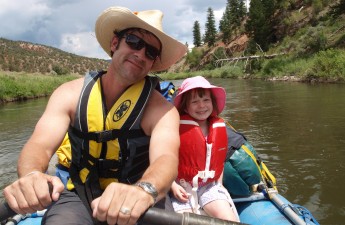
Floating rivers are an incredibly thrilling and enjoyable time and are generally safe; however, river running and camping have inherent risks.
Remember these safety hints
- Be sure to pack the correct gear for your .
- When in Doubt, Scout it Out. Identify a stretch of river appropriate for your group and plan your route ahead of time. How to Understand Whitewater
- When in Trouble, Be Active – when you find yourself in a difficult situation always keep trying to help yourself
- Dress for Success; Wear Your Personal Floatation Device (PFD/Life Jacket)
- Watch Your Step – river sandals offer the best traction on wet rocks from slips
- Most Accidents Happen in the Home – on a river trip, your campsite is your home. Make sure you set up a camp where you have little risk from flash floods and give wildlife plenty of space.
- Think Before You Drink – boil, filter, or chemically treat all drinking, cooking and dishwashing water
- Be sure to follow the specific guidelines for the stretch of river you are using. Depending on the ecosystem and the amount of use, there may be special requirements for overnight trips. Often along the Eagle Blue Trail, fire pans and portable toilet systems are required for overnight camping along the river.
River Etiquette and Minimal Impact Use
Once you have an understanding of the importance of safety in running rivers, it’s also important to understand the etiquette and social rules of the river. Just like any community, river runners have a certain etiquette and understanding with each other about responsible behaviors when on the river. Not only do we care about minimizing impact to the river by cleaning up and packing out, but we also want to show respect and care to one another. Click to learn more about how you can participate in positive river culture and protect our rivers for the future.
You affect this river canyon when you pass through it. River users come to their local rivers and streams for many reasons, but none of them come expecting to find vegetation hacked, beached and banks scarred with fire rings or fouled with human waste and scattered litter. The following tips help visitors be more caring and responsible members of the river community:
- At boat ramps – wait your turn and unload quickly to avoid “ramp rage”
- Please be respectful of private lands, floating across private land is legal as long as the river bottom or banks are not touched.
- Avoid the railroad tracks for your safety
- Be respectful of other users on the river, spread out and avoid unpleasant encounters
- When choosing a campsite, try to leave larger sites for larger groups if your group is small
- It is recommended to use a fire pan and carry out ash and other unburned fire residue with other garbage when using dispersed campsites.
- It is highly recommended to pack out all solid human and pet waste from the river corridor. Use developed toilets whenever possible. Please set up an approved portable toilet as soon as practical upon arriving at the campsite.
- Current Leave No Trace practices recommend discarding urine and waste water in the river
Additional Resources on Safety from our Partners:
American Canoe Association
Photo Credit: Upper Colorado River, Jamie Mierau
